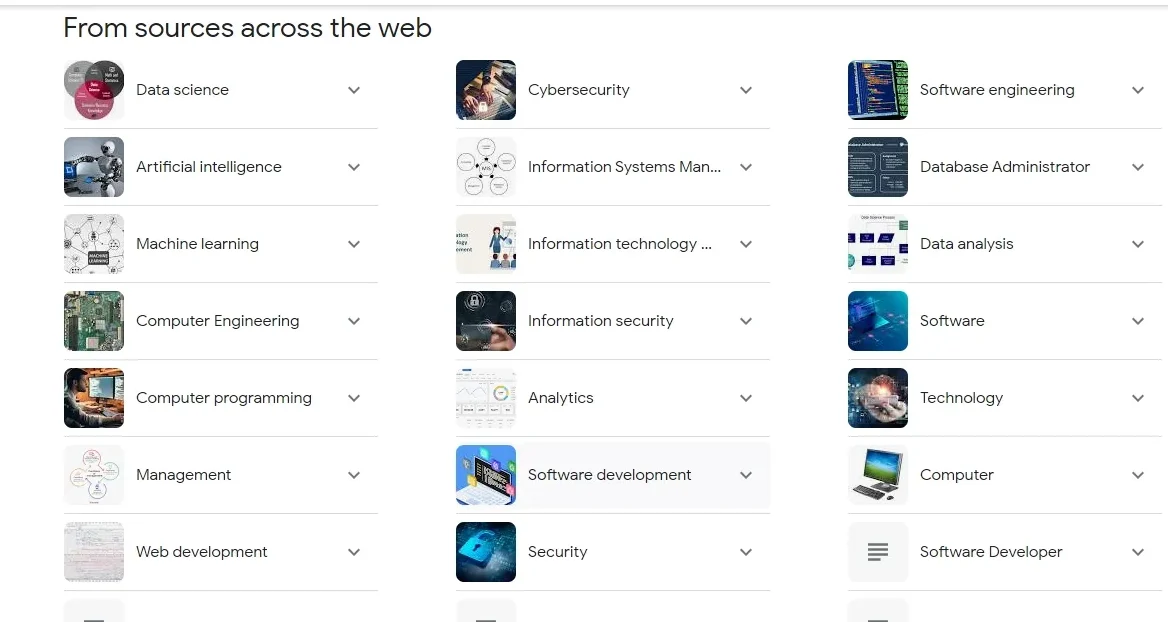Information technology (IT specialization) is a broad field that encompasses a wide range of skills and disciplines, from computer programming and software development to network administration and cybersecurity.
There are many different ways to specialize in IT. The best IT specialization for you will depend on your interests, skills, and career goals. Either you passionate about coding, software development may be a good fit. Or interested in working with networks, network administration may be a better choice. And if you are concerned about security, cybersecurity may be the right path for you.
Here is the IT category where we upload updated articles.
Factors to consider when choosing an IT Specialization:
- Your interests and skills:
What are you passionate about? What are you good at? If you’re not sure, take some time to explore different IT specializations and see what interests you the most.
- Your career goals:
What do you want to do with your IT degree? Do you want to work in software development, network administration, cybersecurity, or something else? Consider the type of work you enjoy doing and the skills you need to succeed in that field.
- The job market:
What are the most in-demand IT skills? What are the salaries for IT professionals in your area? Do some research to see what kinds of opportunities are available in the IT field.
Once you have considered these factors, you can start to narrow down your options.
Popular field of IT specializations:
These are just a few of the many popular IT specializations available.
- Software development:
Software developers create and maintain computer software. They use programming languages to write code that tells computers what to do.
- Web development:
Web developers design and create websites. They use HTML, CSS, and JavaScript to create the look and functionality of a website.
- Database administration:
Database administrators manage databases. They ensure that databases are secure and reliable and that they meet the needs of users.
- Network administration:
Network administrators manage computer networks. They install and maintain network hardware and software, and troubleshoot network problems.
- Cybersecurity / Information security:
Cybersecurity / Information security professionals protect information and networks from unauthorized access, use, disclosure, disruption, modification, or destruction. They use a variety of tools and techniques to prevent, detect, and respond to cyberattacks.
- Data Science:
Data scientists collect, analyze, and interpret data. They use data to solve business problems and make predictions.
if you wanna to explore “fields in IT you can also read this Article“.
Other fields for IT specializations:
- DevOps engineer:
DevOps engineers work to automate the process of software development and deployment. They use a variety of tools and techniques to shorten the development lifecycle and improve the quality of software.
- Big data analytics:
Big data analytics professionals use large datasets to solve problems and make predictions. They use a variety of tools and techniques to extract insights from data.
- Cloud architect:
Cloud architects design, deploy, and manage cloud computing solutions. They use cloud computing to store, process, and analyze data.
- IT security analyst:
IT security analysts identify and mitigate security risks. They use a variety of tools and techniques to protect information systems from cyberattacks.
- IT project manager:
IT project managers plan, oversee, and execute IT projects. They ensure that projects are completed on time, within budget, and to the required quality standards.
- IT consultant:
IT consultants provide advice and guidance to businesses on IT matters. They help businesses to improve their IT systems and processes.
- IT entrepreneur:
IT entrepreneurs start and run IT businesses. They identify and develop new IT products and services, and they market and sell these products and services to businesses and consumers.
- IT educator:
IT educators teach IT courses at colleges, universities, and technical schools. They help students to develop the skills and knowledge they need to succeed in IT careers.
- IT researcher:
IT researchers research new IT technologies and applications. They publish their research in academic journals and conferences, and they transfer their research findings to the public and private sectors.
- IT support:
IT support professionals provide technical support to users of computer systems and networks. They troubleshoot problems, install software, and train users on how to use IT systems.
- Systems administration:
Systems administrators install, configure, and maintain computer systems and networks. They ensure that systems are secure and reliable and that they can meet the needs of users.
- Network engineering:
Network engineers design, build, and maintain computer networks. They ensure that networks are reliable and secure and that they can meet the needs of users.
The best way to choose the right one for you is to do your research and find the specialization that aligns with your interests, skills, and career goals.
Some additional tips for choosing an IT specialization:
- Talk to people in the IT field:
Ask them about their job duties, what they like and dislike about their work, and what skills are in demand.
- Take online courses or workshops.
This can help you learn more about different IT specializations and get hands-on experience.
- Volunteer or intern in an IT role.
This is a great way to get real-world experience and see if a particular specialization is right for you.
- Your learning style:
How do you best learn?
- Your educational background:
What is your level of education? Do you have a bachelor’s degree? A master’s degree? Some IT specializations require a certain level of education, so it’s important to consider your academic background.
- Your personality type:
Some IT specializations are more suited to certain personality types than others. For example, software development may be a good fit for people who are creative and analytical, while network administration may be a better fit for people who are detail-oriented and organized.
- Your lifestyle:
Consider your work-life balance needs. Some IT specializations require long hours or on-call rotations, while others are more flexible.
- Your financial goals:
How much money do you want to make? Some IT specializations pay more than others.
No matter which IT specialization you choose, you can be sure that there is a high demand for qualified IT professionals. The field of IT is constantly evolving, so it’s important to stay up-to-date on the latest trends and technologies.
By choosing an IT specialization that interests you and that aligns with your skills and goals, you can set yourself up for a successful career in the field.
Best fields for IT specializations in 2023:

Here are some of the best IT specializations to learn in 2023:
- Machine learning:
it’s a type of artificial intelligence (AI) that allows computers to learn without being explicitly programmed. Machine learning algorithms are used to analyze data and extract patterns, which can then be used to make predictions or decisions.
- Data science:
that is the field of extracting knowledge from data. Data scientists use a variety of tools and techniques to collect, analyze, and interpret data. They use this data to solve business problems and make predictions.
- Python:
it is a general-purpose programming language that is becoming increasingly popular in the IT industry. Python is known for its simplicity and readability, making it a good choice for beginners.
- Web development:
the process of creating and maintaining websites. Web developers use a variety of technologies to create websites that are both functional and visually appealing.
- Cyber security:
Cyber security is the practice of protecting computer systems and networks from attack. Cybersecurity professionals use a variety of methods to prevent, detect, and respond to cyberattacks.
- Artificial intelligence:
Artificial intelligence (AI) is the ability of machines to mimic human intelligence. AI is used in a variety of applications, such as machine learning, natural language processing, and robotics.
- Blockchain:
A distributed ledger technology that is used to record transactions securely and transparently. Blockchain is used in a variety of applications, such as cryptocurrency, supply chain management, and healthcare.
Conclusion:
These are just a few of the many IT specializations that are in high demand. By choosing a specialization that interests you and that aligns with your skills and goals, you can set yourself up for a successful career in the IT industry. Hope this content helpful for you to choosing IT specialization for “Being an IT Specialist”.
for further details you can read others blogs
FAQ’s
What are the skills needed for each IT specialization?
The skills needed for each IT specialization vary, but some common skills include: Programming languages, Networking, Security, Database management, Cloud computing, Data analysis, Problem-solving, Communication
How can I stay up-to-date on the latest trends and technologies in IT?
There are a number of ways to stay up-to-date on the latest trends and technologies in IT, including: Reading industry publications ( www.techsagemind.com ). Attending conferences and meetups. Following IT experts on social media such as Facebook, Youtube , Instagram, Twitter. Taking online courses and workshops
What are the job prospects for each IT specialization?
The job prospects for each IT specialization vary, but some specializations, such as software development and cybersecurity, are in high demand.
How much do IT professionals in each specialization make?
The salaries for IT professionals in each specialization vary, but some specializations, such as software development and data science, offer high salaries.




